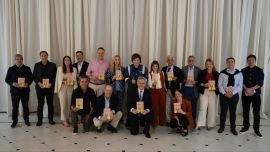Chile’s government delivered its long-awaited lithium development policy in which the state will partner with companies in projects to tap more of the world’s biggest reserves of the battery metal.
President Gabriel Boric announced the new model in a national television address late Thursday. Initially, state copper giant Codelco will sign up partners for new contracts. That role would then be undertaken by a dedicated national lithium company once it’s set up.
The left-leaning administration is seeking a bigger role for the state in a metal that’s critical to the clean-energy transition. At the same time, authorities want to attract more private capital, defend the environment and move further down the value chain.
“Chile has some of the biggest reserves in the world,” Boric said. “This is one of our best opportunities to move towards a sustainable and developed economy.”
It’s a big ask and an important balance to strike for the Chilean economy, the global lithium market and the transition away from fossil fuels. The Latin American nation is the second-biggest supplier of the key ingredient in electric-vehicle batteries.
But Chile has been losing market share to countries such as Argentina where more investor friendly rules have spurred a boom. Chilean output is currently restricted to two companies — SQM and Albemarle Corp — from a single salt flat. Their contracts — which the government has said will be respected — expire in 2030 and 2043, respectively.
The state will have majority stakes in any new production contracts, Boric said in his speech. Codelco will be in charge of negotiating with SQM and Albemarle a stake for the state in their contracts in the Atacama salt flat before their licences expire.
The government plans to set up a lithium institute and is promoting downstream investments to capture more of the EV boom rather than just sending semi-processed material to Chinese and Korean plants. This week, China’s BYD Co was granted access to preferential prices to make battery-grade lithium carbonate at a plant scheduled to begin operations by end-2025.
As a free-trade partner with the United States, Chile stands to benefit from US President Joe Biden’s green stimulus programme. Still, China is Chile’s biggest trading partner based on raw material exports.
With Chilean lithium currently produced in the world’s driest desert, the government has said it plans to require all new projects to employ a production technique that’s barely used commercially in a bid to reduce water losses.
Turning from the current solar evaporation method to direct lithium extraction would speed up output and avoid vaporising billions of litres of salty water. But DLE is relatively untested at scale and initially may mean less output and profit.
Contracts awarded to private companies at the end of the previous government’s term were rescinded last year amid growing resource nationalism and a push to introduce greener techniques.
related news
by James Attwood, Bloomberg
























Comments